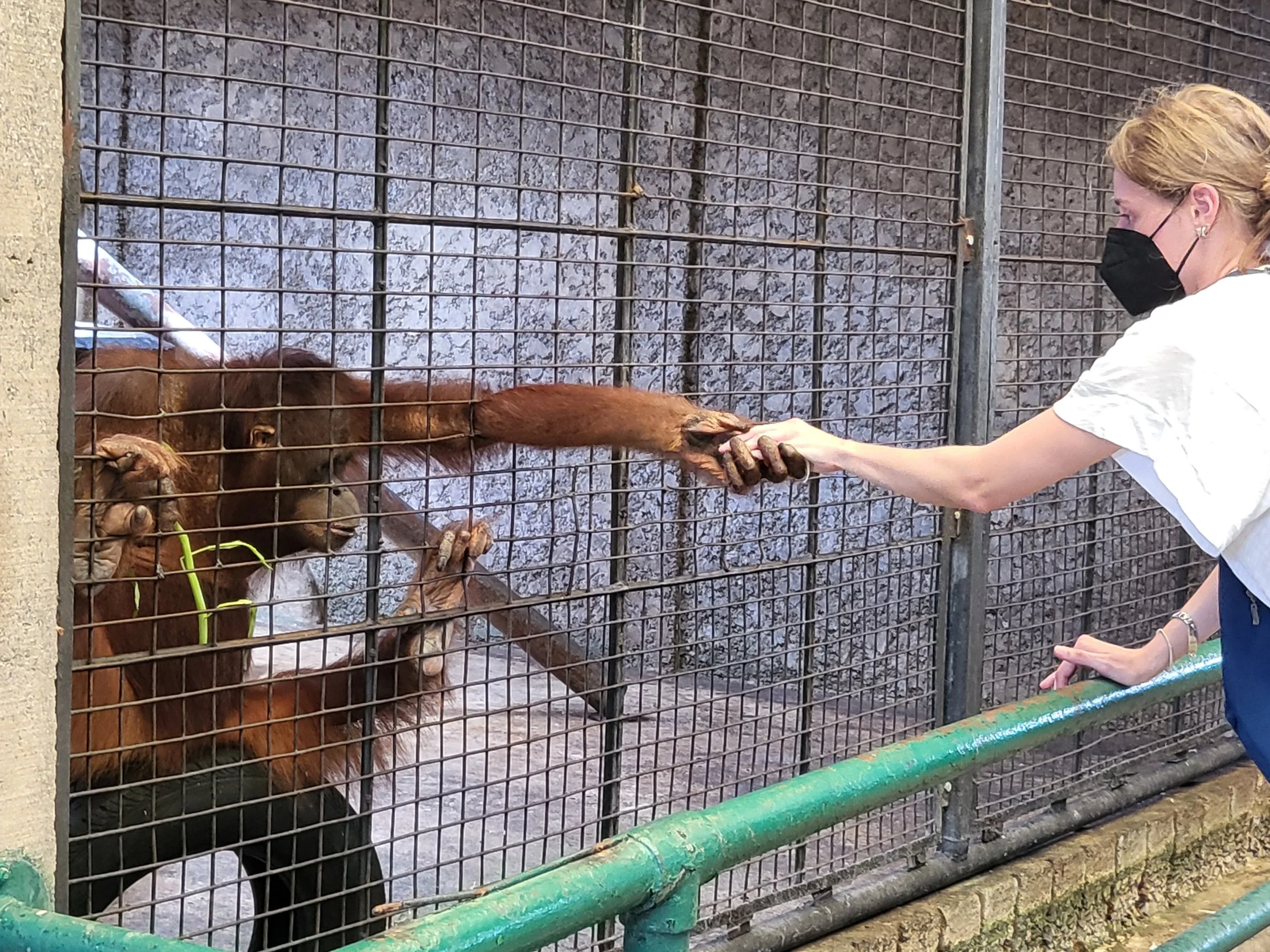An Orangutan’s
Silent Cry for Help
The Pata Zoo’s overlooked and abused orangutan reached out to me, Thai animal protection laws won’t stop the abuse.
BY ANNIKA ROE | 07/29/22
Orangutan at the Pata Zoo reaching for my hand
The heat enhanced the smell of urine in the uncleaned cages of the Pata Zoo. It is about 90 degrees in Bangkok during the day, luckily half of these animals aren't stationed in direct sunlight. They sacrifice a view of the sky for comfort. One of the animals that never sees the sun is an orangutan. She sits in a small concrete cage by herself. Pata Zoo lets you feed these animals through the bars of their enclosure. I offer her a cucumber but she wants to hold my hand instead. I look at the small plaque outside her cage. It is unreadable, she appears to have no name.
“It's a shithole. The worst Zoo in Thailand,” said Tom Taylor, the assistant director of the Wildlife Friends Foundation when referring to the conditions of the Pata Zoo.
I searched online for Pata Zoo orangutans which led me to the Pata Zoo Facebook page. Every week or so, they announce events and photo opportunities with their “docile animals.” There is a small bench where orangutans sit side by side with visitors for photos. The Facebook page is riddled with multiple videos of the primates masturbating, a gorilla drinking milk from a carton, and the orangutans chewing on garbage thrown in their cages. They post everything like it is a joke.
The Facebook page for Pata Zoo is @Patazoo67
I met with Boripat Siriaroonrat, a researcher and faculty of environment and resource studies at Mahidol University and a part of an NGO called the Green World Foundation. When I asked about his opinions on Zoos he remarked, “Abused wildlife for people's entertainment,”.
It is clear that the orangutans are humiliated and abused by the people who watch them. I recognize the same orangutan who took my hand, in a YouTube video of people feeding her chips, touching her face, and laughing.
I emailed Pata Zoo to inquire about the care for some of their animals. I did not receive a response.
I spoke with Roger Lohanan, the founder and secretary-general of the Thai Animal Guardian Association in Thailand. When I asked about Pata Zoo’s orangutans he gave a matter-of-fact response.
“A lot of people show interest in the gorilla, so nobody cares much about the orangutans,” said Lohanan.
Lohanan is referencing Boa Noi, Thailand's last gorilla. Among wildlife activists, she is a household name. She is also held in Pata Zoo and serves as their main selling point. But after my encounter with the orangutan, I wanted to bring her story to the same attention.
How Can This Be Happening?
There are numerous wildlife protection laws that have been passed regarding animals, but abuse and trafficking are still occurring due to loopholes in the legislation and a lack of enforcement.
“The law is in their hands but they don't want to enforce the law,” said Lohanan.
The multilateral treaty, CITES, was developed by the UN and signed into international law in July of 1975, to limit the trade of endangered species. They sort and limit the protections of animals based on appendices, Appendix 1 being highly endangered and highly protected. Orangutans are classified as an Appendix 1 species, however, keeping a wild animal can be excused if it is not used solely for commercial purposes.
“The argument for zoos is that they offer a conservation and an educational value,” said Taylor. “Is breeding this animal that's going to spend all its life in a cage conservation? Is having a sign saying this animal is endangered conservation? Education?”
Along with CITES, the Animal Welfare Act, passed in 2014, exempts zoos for this exact reason. Since orangutans are not native to Thailand, they are not protected under the Thai Wildlife Protection Act of 2019.
Having a zoo in Thailand requires a zoo license, but this is relatively easy to obtain and the process is done entirely on paper. There is also no limitation on how small the living space for the animals can be.
“It's totally up to the zoo owner. The [private] zoo owner is considered an expert as far as the authorities are concerned,” said Lohanan.
There is no inspection of the property unless it is specially requested by a government official. Even when there have been inspections, nothing has been done. Pata Zoo has had multiple inspections before, but they have received no more than a warning each time. In 2019 they renewed their zoo license. They can legally own these animals until 2024.
Prior to me handing the orangutan a cucumber, I gave her what looked like a green reed of grass. I was at the bottom of my plastic feeding bin, I felt bad and I went back to buy more cucumbers for her. When I returned, cucumbers in hand, I saw her walking around a post in her
enclosure, dangling the green plant above her head. I wondered if she was pretending she was somewhere else, like the jungle. Maybe she was aware that this wasn’t where she should be. I waved at her to grab her attention, she came over like she had something urgent to tell me.
“When you talk about fully adult great apes like chimpanzees and orangutans you got to understand that the intelligence of an animal like this is that of a 7-year-old child,” said Edwin Wiek, founder of the Wildlife Friends Foundation.
She refused the food I offered, she wanted a voice instead. We shook on it and made a deal.
She changed my life, but I’m not sure if I can change hers.
Everyone Can Make A Difference. Including You.
To help animals who are held in poor conditions in Thailand,
you can donate to the organizations below.


